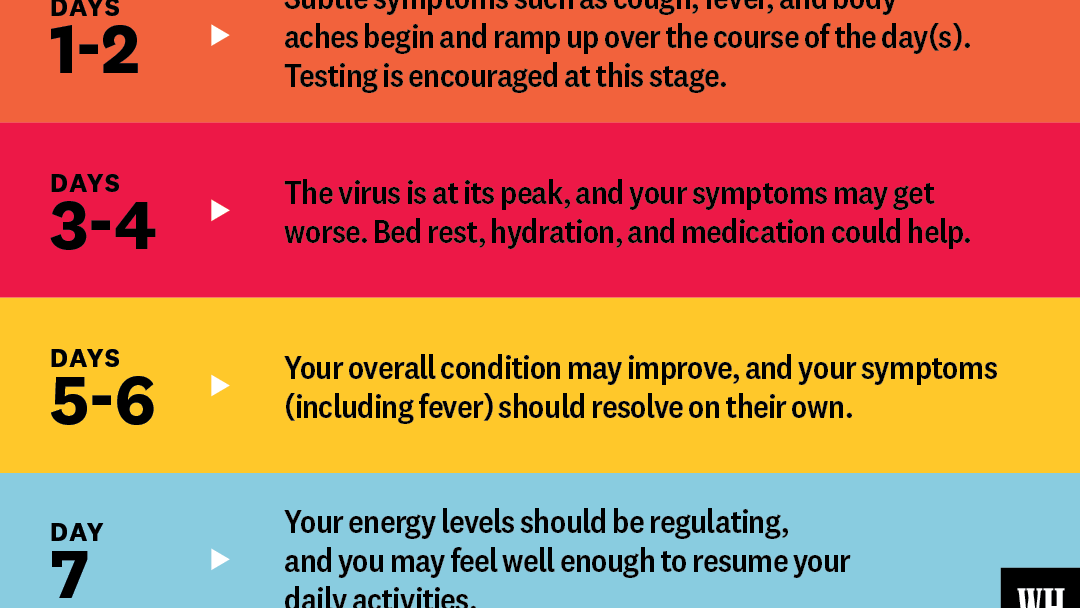If You Have The Flu, Make Sure To Isolate Until You've Been Fever-Free For 24 Hours

Worried about flu season? You’re not alone. ICYDK, the exact time flu season starts changes slightly by a few weeks every year. Some cases begin popping up around October, but the peak is usually from December to February, according to the CDC.
And if you’re wondering just how common it is, influenza was associated with nine million illnesses in the 2021 to 2022 season. With that in mind, the best way to prevent yourself from getting the flu in the first place is by getting vaccinated.
“The flu is going to start picking up over the next few months, and it's not too late to get the vaccine,” says Diego Hijano, MD, an assistant member at St. Jude Children's Research Hospital who specializes in infectious disease.
"The CDC estimates that getting a flu vaccine decreases the risk of flu illness by 40 to 60 percent," adds Shivanjali Shankaran, MD, an infectious disease clinician at RUSH University Medical Group in Chicago, Illinois. "If you do get influenza, being vaccinated dramatically decreases your risk of needing hospitalization, needing ICU care, and death."
But if you already have the flu, know someone who has the flu, or just want to have a better idea of what to expect if you get it, you probably have some lingering questions.
Below, read on to learn all about the common symptoms, isolation guidelines, and the recovery process, with advice straight from the experts.
Meet the experts: Diego Hijano, MD, is an assistant member at St. Jude Children's Research Hospital who specializes in infectious disease in Memphis, Tennessee. Shivanjali Shankaran, MD, is an infectious disease clinician at RUSH University Medical Group in Chicago, Illinois.
Common Flu Symptoms
As with any illness, several symptoms are common among most people who get the flu. This includes:
Fever
Cough
Body aches
Sore throat
Loss of appetite
Nasal congestion
Headaches
Runny or stuffy nose
Fatigue
While it's less likely, some people also experience nausea, vomiting, or diarrhea. Most symptoms tend to start up almost abruptly, says Dr. Shankaran.
Flu Isolation Guidelines
Unfortunately, it's possible to not realize when you should be isolating if you're asymptomatic. "You're shedding the virus at the time of onset, but it can be up to 24 hours before you get the symptoms," says Dr. Shankaran. "If you know that you've had a pretty significant exposure to someone with the flu, you might want to consider being careful, and perhaps wear a mask around the house."
The general rule of thumb is to isolate until you go 24 hours without a fever without the help of fever-reducing medication, along with improving symptoms. That said, it's possible for someone with the flu to still have a lingering cough after their fever has gone away.
"It's better to stay home if you are still coughing and having a lot of respiratory symptoms [even without] a fever," says Dr. Hijano. "If you need to go to work, wear a mask to prevent potential spreading to others."
Common Treatments For The Flu
Many people who get the virus may be asked to stay home, rest up, take acetaminophen or ibuprofen, and drink plenty of water while recovering. "Adults can use over the counter cough and cold medications to help with symptomatic relief," says Dr. Shankaran. She points out that electrolyte-based drinks such as Gatorade (sugar-free for those with diabetes) or Pedialyte could also be helpful to some people.
Some antivirals may help alleviate symptoms quickly such as Tamiflu (or Oseltamivir) and baloxavir marboxil. Both Dr. Shankaran and Dr. Hijano suggest that these medications should be taken as soon as possible. Although, baloxavir marboxil is not recommended for those who are immunocompromised, says Dr. Shankaran.
If you believe you need an antiviral medication, call your doctor to discuss your options and find out how you can get a prescription sent to your local pharmacy.
When should I see a doctor or go to the hospital for the flu?
Considering the various stages of the flu, it can be difficult to tell if you should seek out medical attention. However, there are a few less common symptoms that would signal a trip to the doctor or hospital is needed. These include:
Shortness of breath
Trouble catching your breath
Chest pain
Dizziness
New neurological conditions
"[These symptoms] should prompt you immediately to be evaluated on a more urgent or emergent basis," says Dr. Shankaran. She adds that if you're immunocompromised and think you have the flu, you should contact your provider to be on the safe side.
If you can get tested for the flu before seeking medical attention, that can also help doctors determine the best treatment method.

Day 0
This is the period in which a person will have exposure and get infected with the virus. It's also called the incubation period. "The virus starts making copies of itself and infects the body," says Dr. Hijano. "For most individuals, that will happen in the upper respiratory tract."
At the same time, Dr. Shankaran points out that "day zero" can actually be a one to four-day stretch before symptoms start to present themselves.
Day 1
During day one, subtle symptoms may start to show up. This can look like waking up with a stuffy nose, thinking you're dealing with an allergy, or feeling tired. By the end of day one moving into day two, symptoms may progress quickly or other common symptoms of the flu may show up.
Day 2
Day two is typically when symptoms have fully kicked in. The infected person will begin feeling feverish accompanied by a cough, body aches, or nasal congestion. As previously mentioned, they may also experience more severe symptoms, including nausea, vomiting, or diarrhea.
It can be hard to determine if you have the flu, COVID-19, or just a common cold. In this case, you'd want to get tested sooner than later to determine the best treatment method.
Day 3
Everyone experiences the flu differently, and there are many factors to consider such as whether or not you're immunocompromised or vaccinated against the flu. Someone who is vaccinated will not experience symptoms as severely as someone who is not.
Still, day three through five is normally considered the peak. "Patients will still have a fever, aches, and fatigue, and the symptoms would get worse," Dr. Hijano.
Day 4
While some people may start to find relief from their symptoms, others may still be at their peak. Dr. Hijano points out that there's no way to tell what will occur during the middle stages of flu recovery because of how different bodies respond to the virus. Instead, he suggests that whether or not a person is improving can best be determined on a day-by-day basis.
"In retrospect, you'll be able to say 'yesterday was my worst day,' says Dr. Hijano. "You can't really assess that ahead of time. Just know that as you develop symptoms, you're going to feel worse before you feel better. But you'll be able to tell every day when you wake up."
Day 5
By day five, there should be some signs of improvement in a person's overall condition. "Different people can recuperate over different periods of time, but usually by five to seven days most people are getting better," says Dr. Shankaran.
She adds that at this point, anyone with a fever, in particular, should start to see their temperature lowering. On the other hand, some people may be reaching the end of their peak.
Day 6
Come day six, most people will notice that their fever is gone or perhaps showing up on and off rather than having a consistently high body temperature. Anyone with a sore throat or body aches may no longer have those symptoms as well.
Improvement can also mean the person is able to breathe better, they've regained their appetite, or their energy levels have returned to normal.
"You may want to ease into things rather than just going back to a hundred percent immediately because you're still recovering," advises Dr. Shankaran. "You should start slower until you know exactly how you're feeling."
Day 7
By the end of the week, you should feel up to leaving the house, doing activities, or starting up your normal routine again. There's the chance you may have a lingering cough, in which case, again, you should wear a mask until the symptoms subside.
However, if a person is going into day seven and is suddenly beginning to experience breathing issues and chest pains accompanied by a returning fever, it may be an indication of post-flu complications. "The one frequent complication that can be very severe is pneumonia, which is an infection of the lungs by a bacteria," says Dr. Hijano.
"It involves inflammation of the lungs," adds Dr. Shankaran. "It can be from the flu itself. And some people, after the flu gets a little bit better, can get a bacterial infection following that. In those situations, you would get an antibiotic as well."
You Might Also Like
